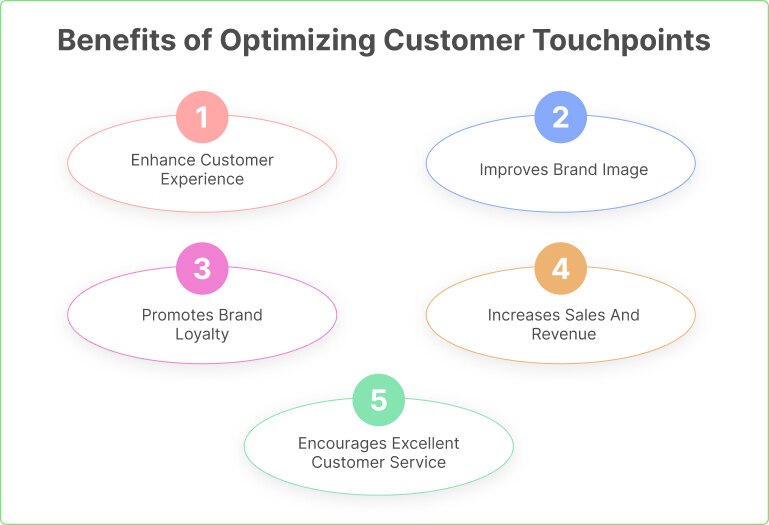 Business Solutions
Business Solutions

30 January, 2024

Beyond any doubt, providing seamless online experiences has now become crucial for any brand looking to satisfy and retain customers. That’s the point, businesses are now optimizing customer touchpoints online to make the the best ways to interact with their products or services at every checkpoint.
But why is optimizing customer touchpoints online beneficial for business?
It’s so simple, optimized touchpoints help to add more value and build trust in the brand to the customer, leading to stronger relationships. Even the more touchpoints there will be, the more immense opportunities for businesses to increase customer satisfaction, and loyalty, driving more sales and growth.
But the query still remains, what are the best ways to improve customer experience at every touchpoint?
Let’s explore with us!
Contents
In general, customer touchpoints are interaction points through which a customer connects with a brand or product. It can occur both under the brand’s control and outside of it, meaning any time overall a customer’s journey. Like before, during, or even after purchasing a brand’s product or service as well.
It’s even quite relatable to your daily activities. Here is a quick example, highlighting how the touchpoints of a business would be:
See, how these work! Even the marketing and customer service teams highly use these points as the roadmap to boost their customer satisfaction and see up to a 60% increase in their CRR.
Typically touchpoints are recorded as a chronological documentation of a customer journey mapping, showing how a customer has with a business starting from seeing an ad, visiting the website, and talking to customer service. This overall shapes experience and the perception of the customers about a brand and allows businesses to optimize accordingly.
Anyway, businesses define the overall journeys in a few stages:
Have a short glimpse of different types of customer touchpoints during these stages:
| Before purchase | During purchase | After purchase | In Customer Service |
| Online advertising | Product reviews | Customer onboarding | Live Chats |
| Social media | Point of sale | Follow-ups | Customer Service Bots |
| Blog posts | Chatbot conversations | Email newsletter | SMS |
| A company website | Product brochures | Subscription renewals | Support emails |
| Events | Email marketing | Customer feedback surveys. | Customer success programs |

Recent data shows that, with just a 5% increase in customer retention through loyal customers, a brand can witness up to 25% to 95% increase in profits.
But to get there, is it so easy?
The answer is absolutely yes: With an effective customer touchpoints optimization that helps you make sure that your customers always interact with your company.
Even don’t assume just end here. Digital touchpoint optimization holds numerous more benefits for businesses, influencing key metrics like conversion rates, brand loyalty, and revenue.
Here are some significant advantages you should know about:
According to a survey, up to 91% of customers avoid doing business with a company again just due to a bad experience. So you can understand how important it is to enhance customer satisfaction and optimize customer touchpoint map can be your best partner here.
For instance, you can check out the touchpoints of the after-purchasing results from your customer. This helps you access the area where your customers mostly like and where you need modification.
By improving these areas, you can easily make interactions intuitive, seamless, and personalized, leading to higher customer satisfaction.
With digitalization, customers have now more options, choices, information, and expectations than before. They now expect consistency in all stages whether they interact via the website, app, phone, or in-store direct.
Optimizing touchpoints across these channels helps businesses ensure a holistic and customer-centric journey for their brand. By doing so, a business can create the most positive perception about its brand to the customer, enhancing its image.
A fantastic example we can see here is IKEA, which optimizes customer touchpoints at almost every step of their journey.
If you visit their store, you will find seamless integration of both online and offline touchpoints, contributing to $40 billion+ annual revenue and beloved brand status.
It’s not even the only one. The number of such companies has jumped from 20% to more than 80% who have successfully converted their leads into paying customers at a 25% higher rate. Source
Customer satisfaction would be like a foundation of any brand that promotes loyalty and encourages customers to be with the brand for a longer time. In such a case customer touchpoint optimization can be a game-changer solution for you through which you can easily foster their trust.
Here is how:
By accessing the touchpoints, businesses can collect valuable data about their customer needs and pain points. This data helps markets to better target their audiences with personalized content and services.
When customers feel like you understand their preferences, they feel valued, and creates a sense of connection with your brand.
As with promoting brand loyalty, companies that excel at personalization can experience a 20% increase in sales uplift. Adding to this, marketers can give their loyal members exclusive rewards and discounts as appreciation.
They will be more likely to share positive reviews about your brand which improves your digital customer engagement process.
Optimizing customer touchpoints is one of the easiest ways to encourage your target audiences to purchase your products and services, streamlining your business growth.
For example, in 2023 Baymard Institute found that 74% of online shoppers abandon purchases due to complexity. Source
Thinking of this major point, a business can optimize the touchpoints to remove complex checkout flows, minimize form fields, and streamline the payment process. This makes it easier for customers to complete purchases across touchpoints.
Moreover, it is far helpful in encouraging repeat purchases. For instance, after customer touchpoint analysis, businesses can manage follow-up emails, replenishment reminder notifications, and various loyalty programs to promote returning customers who purchase more frequently.
A study of Zendesk on customer experience in 2022 reveals that up to 76% of customers want someone to engage with them while they are contacting the company. All that can be possible by a quick optimization of your customer touchpoints.
When you ensure smooth customer interaction points for your business, it ultimately leads to higher first-contact resolution rates.
This means your customers will be more likely to get their issues resolved on the first contact with your customer service team. Also, there will be less back-and-forth communication and a few escalations, ultimately leading to happier customers.
A report by Forbes shows that companies with streamlined customer service workflows experience a 20% increase in agent productivity while up to 15% reduction in operational costs.

Customer touchpoints mainly define the overall journey of customers with your brand. It would start from seeing your product to complete the purchase. A survey shows that up to 94% of customers with low-effort journeys show interest in repeat purchases while only 4% with high-effort experiences.
With more touchpoints,
If you want to develop customer-centric touchpoints to uplevel the overall experience, here are some pro tricks you can follow:
If it is an e-commerce website, the first necessary point is developing a customer-centric strategy to drive sales. The interface should be user-friendly thus anybody can quickly navigate to it without any friction or effort.
Use customer data as much as possible to learn clearly about what your customers demand from you. The more you understand customers and can empathize with them, the better you can meet their needs and create personalized interactions to satisfy them in anyhow.
Leveraging just customer data won’t be enough to coordinate the touchpoints unless you can’t resolve their issue on your own. By fostering a well-built communication system in the touchpoints, you can easily deal with the facts.
For example, thousands of businesses are now integrating live chatbots in customer service to enhance interaction.
A positive, organized onboarding system is important to enhance customer confidence that they are at the right point which helps to set the foundation for a loyal long-term business relationship.
So while optimizing the customer touchpoints, you need to make sure you have a good onboarding team to help each of your customers’ queries.
The importance of email marketing in a business goes beyond the numbers. According to research, up to 96% of people click on their email daily. So you shouldn’t miss the email touchpoint at all.
When you have the email addresses of your potential customers, you can easily update them with your new offers or any discounts, this not only fosters stronger relationships but also helps to engage newers through good reviews. Source
Increased touchpoints allow brands to provide more new offerings and higher-tier products to customers. This helps businesses to recognize their products widely, increasing customer engagement as well as sales.
Businesses need to focus on all the critical touchpoints online including website navigation, product pages, checkout, post-purchase support, shopping cart, and even email journeys as well.
You can conduct surveys like customer reviews and feedback to identify the top existing touchpoints. Also, thorough market research helps marketers find the gaps between customer desires and current touchpoint experiences. This helps them to enhance customer satisfaction through building personalized touchpoints.
Optimizing customer touchpoints is crucial for any brand as they are like the meeting point with the customer. Starting from fostering trust, and loyalty, to building stronger relationships, all are greatly impacted by these intersections.
Even with the data-driven, customer-centric approach to touchpoint optimization, a brand can easily turn its happy customers into true brand advocates.
So from all that thinking, the importance of continuously enhancing and coordinating touchpoints across the entire customer journey is clear now, right??